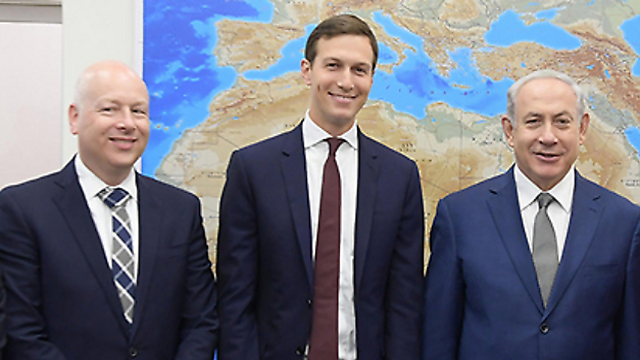
White House convenes donor nations for Gaza conference
Kushner presides over discussions about short-term projects that could improve the situation in the strip; meeting boycotted by Palestinians, but attended by Israel and several Arab nations with no formal diplomatic ties with Israel; unclear if any specific commitments came out of the meetings.
WASHINGTON - Arab nations that don't formally speak to Israel joined Israeli officials and others at the White House on Tuesday for an unusual meeting on the dire humanitarian situation in the Gaza Strip.
The conference of 19 international donor nations appeared aimed at altering the perception among Palestinians that President Donald Trump's White House is less concerned with their future than Israel's.
Trump's son-in-law Jared Kushner, who is leading the White House effort to broker Israeli-Palestinian peace, gave a two-hour presentation to the attending countries and presided for several hours over discussions about short-term projects that could improve the situation in Hamas-run Gaza, which is on the brink of economic disaster.
The Trump administration has been seeking to restart peace talks between Palestinians and Israelis. But the Palestinians have essentially cut off ties to the White House, furious over Trump's move last year to recognize Jerusalem as Israel's capital and move the US Embassy there from Tel Aviv.
For that reason, the Palestinians boycotted the meeting, a decision that drew expressions of regret from Greenblatt and other US officials.
Potential electricity, water, sewage, and health projects were discussed, but officials declined to outline specific proposals. A senior administration officials insisted that many projects could be implemented without assistance of the Palestinian Authority, but the goal was to have it ultimately engage in the multi-lateral process.
However, it was unclear whether any specific commitments or new projects came out of Tuesday's meeting. Senior administration officials who briefed reporters after the meeting on condition of anonymity declined to offer details or to describe what countries participating in the summit had put forward.
Still, the meeting was notable in that it included nations like Saudi Arabia, Bahrain, Qatar and Oman, none of which have diplomatic relations with Israel. Jordan and Egypt, the only two Arab countries to have struck peace deals with the Jewish state, also participated. Several European nations were also in attendance. The format did not allow for direct discussions between Israel and the Arab states, officials said.
The conference came the same day that a roadside bomb struck the convoy of Palestinian Prime Minister Rami Hamdallah as he entered Gaza, the latest complication for reconciliation efforts between rivals Hamas, which runs the Gaza Strip, and the Palestinian Authority, in control in the West Bank.
Hamas denied involvement, and there was no official claim of responsibility. But officials at the conference cited it as an example of the challenges posed by Hamas control over the strip.
Israel has become more alarmed about the drastic situation in Gaza, and called an emergency meeting of donors in Brussels recently to try to rally funding for development projects—such as the new water-treatment plant that Hamdallah had been traveling to visit for a ribbon-cutting ceremony. But there has been little enthusiasm from the global community, frustrated after years of little progress in Gaza.
Gaza faces a 43.6 unemployment rate, and many in Gaza blame Israel for the hardships, accusing it of placing an economic blockade on the enclave that has drastically reduced movement of people and goods.
But Gazans also fault their own leaders, complaining of a power struggle between Hamas, the armed group that seized military power in Gaza in 2007, and Fatah, the secular party of Western-backed Palestinian President Abbas.
Reuters contributed to this story.


















